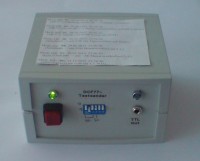DCF-Tester and Transmitter

For testing of DCF-decoding routines and DCF-clocks I had build a small DCF-code generator based on a small ATTiny85. It had seven pre-programmed "critical" DCF-time/date combinations and could output an inverted or uninverted TTL-Signal.
For testing of DCF-decoding routines and DCF-clocks I had build a small DCF-code generator based on a small ATTiny85. It had seven pre-programmed "critical" DCF-time/date combinations and could output an inverted or uninverted TTL-Signal.
The "critical" DCF-time/date combinations are those, where a DCF-decoding routine can get confused. These are especially the times when the official changes from standard-time to daylight-saving time are applied. Furthermore it are the times when a DCF-receiver loses synchronisation and has to count the time forward by it's internal timebase. This is critical especially at the switchover from 28./29. of february to march, 1. in agap-year or during the switchover to a new year.
The selection of the preprogrammed codes and the inverted/non-inverted modes is made by dip-switches.
Inspired by the Elektor article-series "SDR mit AVR" (3,4,5/2012) from Martin Oßmann I have added to 2 useful features:
- a real 77.5kHz signal is generated which can set and test any DCF-clock you put near the inductor of the LC-filter (aka ferrit-antenna)! Tests have shown that the signal from the inductor can "reprogram" DCF-clocks up to a few meters distance.
- with the help of a simple RS-232 serial adapter (consisting of 2 resistors) you can set the DCF-tester to any time and date you want with a terminal-program. The ATtiny sends the time-/date-code every second also over RS-232
For that purpose I had to switch over to a sllightly larger ATtiny 84. As you can see from the circuit diagram the whole circuit needs only a handful of easily available components. The ATtiny is programmed in BASCOM and the code can be easily modified.



Discussion (1 commentaire(s))